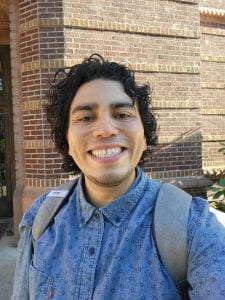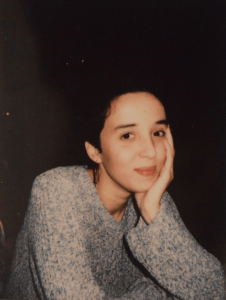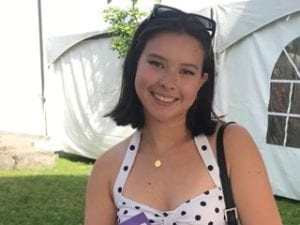Timothy Herrera is the new program coor dinator. Timothy recently graduated with a PhD in cultural anthropology at the University of Oregon and has previous experience as a program coordinator for Centro Latino Americano. In addition to bringing deep skills for working reciprocally with communities, Timothy is a Spanish speaker. He will be the primary contact for the Traditional Arts and Apprenticeship Program (TAAP), the Cultural Keepers Roster, Culture Fest, and the Statewide Survey.
dinator. Timothy recently graduated with a PhD in cultural anthropology at the University of Oregon and has previous experience as a program coordinator for Centro Latino Americano. In addition to bringing deep skills for working reciprocally with communities, Timothy is a Spanish speaker. He will be the primary contact for the Traditional Arts and Apprenticeship Program (TAAP), the Cultural Keepers Roster, Culture Fest, and the Statewide Survey.
As the new program coordinator, Timothy has helped execute our Oregon Culture Night series in the month of August. He has help coordinate the translations of TAAP guidelines, did bilingual outreach for the 2023 call for applications, helped develop a newsletter specifically for the artists on our Cultural Keepers Roster, has conducted an interview in Spanish while simultaneously doing English interpretation for the statewide survey, is supervising student employees and interns, and is currently helping equity & inclusion initiatives with the public programs team at the Museum of Natural and Cultural History.
Timothy expressed: “I am grateful for this opportunity to serve the diverse communities of Oregon; to collaborate with state’s cultural keepers and helping address any needs they may have so that they can sustainably continue their traditions; to use the ethnographic skills that I have developed for public programming purposes; and to further develop OFN’s relationships with Oregon’s vast Spanish speaking communities”.
Iryna Stavynska is a Fulbright scholar from Ukraine, pursuing a master’s d egree in Folklore at the UO. She spent her summer internship at OFN coordinating Oregon Culture Nights events and interviewing and documenting Ukrainian folk artists in Oregon – weavers, singers, embroiderers, pysanka artists, and doll makers. Iryna wishes to express her deepest gratitude to OFN for offering her the opportunity to reconnect with her homeland’s culture while being so far away from home, and for allowing her to learn first-hand how public folklore organizations such as OFN can help amplify the voices of underrepresented and oppressed communities, and help one find meaning during the darkest of times. Iryna hopes to continue her internship with OFN and her work with Ukrainian artists in the fall term.
egree in Folklore at the UO. She spent her summer internship at OFN coordinating Oregon Culture Nights events and interviewing and documenting Ukrainian folk artists in Oregon – weavers, singers, embroiderers, pysanka artists, and doll makers. Iryna wishes to express her deepest gratitude to OFN for offering her the opportunity to reconnect with her homeland’s culture while being so far away from home, and for allowing her to learn first-hand how public folklore organizations such as OFN can help amplify the voices of underrepresented and oppressed communities, and help one find meaning during the darkest of times. Iryna hopes to continue her internship with OFN and her work with Ukrainian artists in the fall term.
Yosser Saidane  is a MA student in the folklore program at the University of Oregon. She is interested in areas of vernacular culture in the Maghreb region of North Africa. Her research is focused on the performance of folk religion within a number of Sufi orders in Tunisia. Before turning to folklore, she worked as an instructor of English at the University of Gabès. She holds a B.A. in Anglo-American studies from the Ecole Normale of Tunis and an agrégation degree from the Faculty of Letters, Arts and Humanities of Manouba.
is a MA student in the folklore program at the University of Oregon. She is interested in areas of vernacular culture in the Maghreb region of North Africa. Her research is focused on the performance of folk religion within a number of Sufi orders in Tunisia. Before turning to folklore, she worked as an instructor of English at the University of Gabès. She holds a B.A. in Anglo-American studies from the Ecole Normale of Tunis and an agrégation degree from the Faculty of Letters, Arts and Humanities of Manouba.
Erin Wai is a first-year M.A. student in Folklore and Public Culture. She completed her undergraduate degree in Journalism and Humanities with a Minor in Music at Carleton University in Ottawa, Canada. Her research interests center around studying decolonial theory in storytelling, myths, and legends, and how individual experiences influence the collective memory of history. In her free time, Erin likes to ski, paint, and play music.
Culture. She completed her undergraduate degree in Journalism and Humanities with a Minor in Music at Carleton University in Ottawa, Canada. Her research interests center around studying decolonial theory in storytelling, myths, and legends, and how individual experiences influence the collective memory of history. In her free time, Erin likes to ski, paint, and play music.
Gabrielle Miller is a first-year graduate student pursuing her master’s degree in Folklore and Public Culture at UO. She got her bachelor’s degree from Western Oregon University in cultural anthropology and linguistics. As a descendant of the Confederated Tribes of Grand Ronde and Pechanga, she is interested in cultural sustainability and language revitalization within native communities and hopes to work with those native communities in the future. Her work here at OFN has given her inspiration and experience for working with folklife and amplifying indigenous voices. Her interests in folklore are ever-changing and evolving and she looks forward to researching the connection to folklore in our identity and expressions.
master’s degree in Folklore and Public Culture at UO. She got her bachelor’s degree from Western Oregon University in cultural anthropology and linguistics. As a descendant of the Confederated Tribes of Grand Ronde and Pechanga, she is interested in cultural sustainability and language revitalization within native communities and hopes to work with those native communities in the future. Her work here at OFN has given her inspiration and experience for working with folklife and amplifying indigenous voices. Her interests in folklore are ever-changing and evolving and she looks forward to researching the connection to folklore in our identity and expressions.
